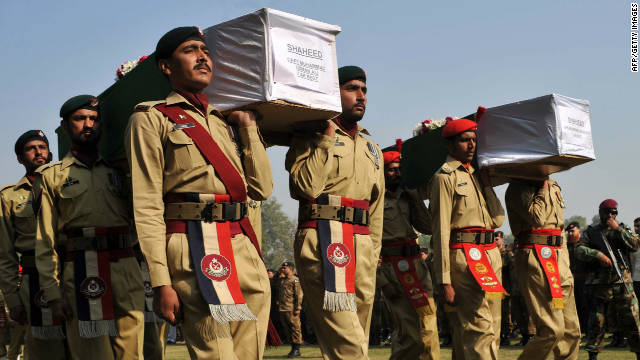
STORY HIGHLIGHTS
- NEW: A top Afghan official warns of possible conflict with Pakistan
- Pakistan denies firing first at NATO aircraft that killed two dozen Pakistanis
- The Pakistani Taliban say Pakistan must respond in kind to the attack
- Pakistan's prime minister warns about violations including the Osama bin Laden raid
The Pakistani Taliban urged Pakistan to respond in kind to the airstrike, which NATO called a "tragic unintended" event.
The Pakistani military insisted Monday it had not fired first in the incident, and it said it had told NATO its aircraft were firing on friendly troops.
Meanwhile, a top adviser to Afghan President Hamid Karzai warned that Afghanistan and Pakistan could be on a path to conflict.
U.S.-Pakistan relations strained
NATO admits fault in Pakistan attack
Pakistan's Prime Minister Yousuf Raza Gilani said in an exclusive interview with CNN Monday that Pakistan was re-evaluating its relationship with the United States.He said the South Asian nation wanted to maintain its relationship with the United States as long as there was mutual respect and respect for Pakistani sovereignty.
But Gilani highlighted incidents such as the killing of the Pakistani troops and a U.S. raid into Pakistan to kill Osama bin Laden as violations of his country's sovereignty.
The prime minister also said Pakistan had not yet decided whether to boycott next month's Bonn conference on the future of Afghanistan.
Pakistan turned back 300 trucks carrying NATO supplies and fuel into Afghanistan Monday, government officials Syed Ahmed Jan and Mutahir Zeb told CNN.
Pakistan is a vital land supply route into Afghanistan for the United States and its allies.
Separately, Pakistani military spokesman Maj. Gen. Athar Abbas denied the reports that Pakistani troops opened fire first on the NATO helicopters.
Speaking by phone to Pakistan's Geo TV News, Abbas said NATO helicopters opened fired first on the Pakistani military checkpoints.
Abbas said the soldiers notified Pakistan military headquarters, which informed the NATO authorities immediately.
The spokesman said Pakistani soldiers fired at the NATO aircraft in retaliation.
NATO's secretary-general earlier said it was a "tragic unintended" incident, and pledged to ensure such attacks don't reoccur.
"NATO remains strongly committed to work with Pakistan to improve cooperation to avoid such tragedies in the future," Anders Fogh Rasmussen said in a statement.
The Pakistani Taliban appeared Monday to try to widen the rift between Pakistan and the United States.
Pakistan Taliban spokesman Ihsanullah Ihsan said in a phone call to CNN that America will infringe on Pakistan's sovereignty and continue operations on Pakistani soil in the coming days.
Ihsan said Pakistan must respond in kind to the NATO attacks, and he warned that the Pakistani Taliban will continue their jihad as long as Pakistan remains an ally of the United States.
In Kabul, meanwhile, a senior adviser to Afghan president Hamid Karzai said Afghanistan and Pakistan may be on a course toward military conflict.
Ashraf Ghani said the link between Pakistan and the assassination of a former Afghan president had united his country "against interference."
Ghani accused Pakistan of harboring and assisting the insurgency in Afghanistan, and said his country's neighbor probably helped the suicide bomber who killed Burhanudin Rabbani in September.
"You need to talk to Pakistan and Pakistan needs to choose," Ghani said. "Does it want to slide down a path of three generations of conflict with Afghans?"
"The assassination of President Rabbani has gelled the nation together against interference. And one or two more actions could put us in an irreversible course [towards] conflict. And we've shown through our history that we are a match for any invader," he said.
The two nations have been trading accusations in the border regions in the past few months, with Pakistan accusing the Afghans of harboring militants and Afghanistan claiming Pakistani shells have hit their territory.
CNN's Nick Paton Walsh reported from Kabul, Afghanistan. Journalists Nasir Habib, Shaan Khan and Saboor Khattak in Pakistan contributed to this report(cnn)

No comments:
Post a Comment